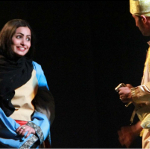
In this podcast ‘Shakespeare in Yemen’, Dr Katherine Hennessey discusses Yemen as perhaps the only country in the world that can lay claim to a history of theatre that begins with a performance of Shakespeare. The first documented play by Yemeni actors was Julius Caesar, in Arabic translation, performed in a public square in Aden in 1910. This lecture explores the surprisingly vibrant history of adaptations of Shakespeare on the Yemeni stage. It celebrates the talent of the actors, actresses, and directors who have interpreted plays like Romeo and Juliet, Othello, and The Merchant of Venice for Yemeni audiences throughout the 20th century and into the 21st, and illustrates the means by which these Yemeni theatre practitioners have transformed their stages into a forum for political critique and public debate. Perhaps most importantly, the lecture illustrates the richness of the Yemeni performing arts, at a time when the predominant news stories about the country are of crisis and turmoil—a narrative of creativity and artistic self-expression surviving tenaciously even in the face of violence and destruction.
Dr Katherine Hennessey is a Research Fellow with the Global Shakespeare programme at the University of Warwick and Queen Mary University of London (2014-16), and a Moore Institute Visiting Fellow at the National University of Ireland, Galway (late 2016). From 2009 to 2014 she lived in Sana’a, Yemen, researching contemporary Yemeni theatre. Her writing on Yemen has appeared in numerous publications including Middle East Report, ArabLit, and Arab Stages, and the anthologies Why Yemen Matters (2014) and Arabia Incognita (2016). Hennessey is co-editor, with Margaret Litvin, of the special ‘Arab Shakespeares’ issue of Critical Survey (28.3, December 2016), and author of Shakespeare on the Arabian Peninsula, forthcoming from Palgrave’s ‘Global Shakespeares’ series.


Leave A Comment